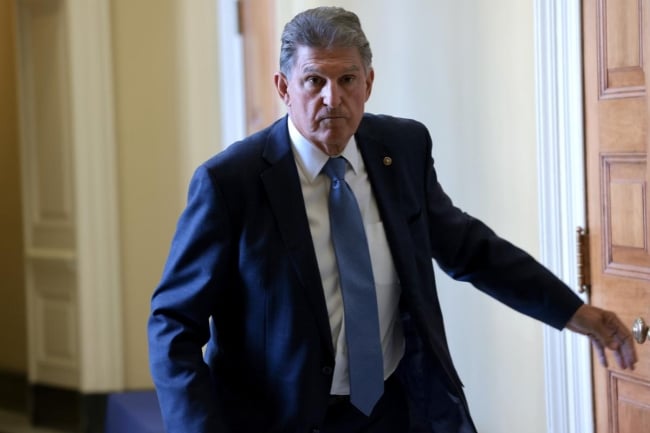You have /5 articles left.
Sign up for a free account or log in.

Senator Joe Manchin
Win McNamee/Getty Images
President Biden signaled last week that his plan for tuition-free community college is on life support in Congress, but policy experts say the program could still be salvaged -- at least in part -- while fitting into lower-cost legislation.
All 50 Senate Democrats have to be on board to pass Biden’s big social spending plan -- which also includes a boost to the maximum Pell Grant award, funding for minority-serving institutions and a college completion fund pilot program -- via the budget reconciliation process. But moderate Democratic senators Joe Manchin of West Virginia and Kyrsten Sinema of Arizona are firmly against the original legislation’s price tag, which came in at $3.5 trillion. Manchin previously said he would support a maximum of $1.5 trillion and has been encouraging his Democratic colleagues to cut down on the number of priorities included in the package.
One of those cuts under consideration appears to be the America’s College Promise program, the part of the Build Back Better Act that would provide two years of universal tuition-free community college through a federal-state funding partnership. Biden told reporters last Friday that it’s unlikely Congress will provide the level of investment that he’s proposed for the program.
“I don’t know of any major change in American public policy that’s occurred by a single piece of legislation … and so, you know, I doubt whether we’ll get the entire funding for community colleges,” Biden said.
The duration of program has already shrunk from 10 years in Biden’s original proposal to five years in the current draft of the budget reconciliation bill that was crafted by House Democrats. Still, further cuts and limitations can be imposed without ruining the integrity of the program, experts say, even if they aren’t ideal.
Lawmakers could again shorten the length of funding for the program, making it a three- or four-year pilot program, said Michelle Miller-Adams, a political science professor at Grand Valley State University and researcher at the Upjohn Institute. Even though the program would be funded for a shorter period of time, it’s expected that students would still take advantage of it, and because of that, Congress would be inclined to continue to fund it into the future.
“If they cut a year off, we’ll be able to work with the states,” said Jee Hang Lee, senior vice president at the Association of Community College Trustees. “Then, we can continue to have a conversation with Congress and the administration after the implementation. We’ll see significant enrollment increases, and we can showcase that. Hopefully, that will drive Congress to continue to support and provide funding for it.”
A longer program would be ideal, but cutting its duration is a much more preferable solution than the other cost-reducing option, said Miller-Adams -- which is tying the benefit to financial need.
Restricting access to tuition-free community college based on family income -- referred to as a “means test” -- would limit who can take advantage of the benefit, ultimately lowering the overall price tag of the program. Means testing is also under consideration for other parts of the bill, such as provisions providing for universal childcare and Medicare expansion.
It’s unclear what threshold lawmakers would set for an income limit on the program. But advocates are clear -- a means test would conflict with what Biden’s proposal is meant to accomplish.
“When you’re trying to parse out, ‘Oh, we’re going to set a cap here’ or ‘we’re going to narrow eligibility in this way,’ you do undermine the overall message, which in this context, can be very powerful as a policy innovation,” said Reid Setzer, director of government affairs at the Education Trust. “In Tennessee, that ‘free’ message did appear to trigger enrollment increases in both rural and urban areas.”
Miller-Adams said it would be unnecessary to means test a program that is effectively already targeted to lower-income students, since that’s the population of students that community colleges disproportionately serve.
Four House Democrats from Michigan sent a letter Monday to House Speaker Nancy Pelosi, a Democrat from California, and Majority Leader Steny Hoyer, a Democrat from Maryland, urging that “universal investments” in free community college remain in the final bill.
“Investing in high-quality education for every American free of means-testing criteria will be critical in our fight to build back better from the pandemic and grow our economy,” the lawmakers wrote. “We have a once-in-a-generation opportunity with the Build Back Better Act to make good on the American promise of a high-quality education by offering two years of free community college to all Americans.”
Democrats are determined to pass both the budget reconciliation package and an accompanying infrastructure bill by Oct. 31, giving the White House and Congress less than two weeks to settle on a top-line dollar figure and decide which priorities can fit into that amount. Whether free community college is trimmed or cut completely in the legislation’s final version, the Biden administration isn’t expected to give up on it easily, said Terry Hartle, senior vice president for government relations and public affairs at the American Council on Education.
“If there’s any way to keep it, the administration will keep it,” Hartle said. “It is their top student aid and higher education priority.”




